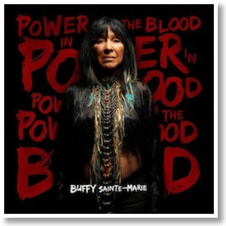Carry It On

Sainte-Marie took time from her music, art and change-making to talk up art as activism in the twenty first century music scene.
Nori Hubert: You have been creating music in the public sphere for over four decades. What has been the biggest change you’ve seen in the industry during this time?
Buffy Sainte-Marie: Computers, and the development of digital art and digital music tools which have made it possible to be an artist who actually reaches people. It used to be that newspapers, magazines, radio, and television were all owned by a few corporations. It was their business and they called all the shots, and unless you had your own great white shark, you could get eaten alive by theirs.
Pretty dramatic, eh?
But now, with computers more affordable and user friendly, many artists can perfect and duplicate their own art and music at home, raise public awareness via social media, and distribute their work intact via their own online stores. A lot of the middlemen and gatekeepers who used to influence both the artist and 'the product' have gone away. Used to be every guy at the record company would want to lift his leg on your song. With a little digital studio and the internet, now your art is from you, pure and meaningful to your intention, and there's a much more direct connection between the artist and the audience.
I've been making electronic music since the 1960s and used music computers throughout the seventies, and in the eighties I got my first Macintosh and it changed my life and the way I do business and create art and music.
How have changes in music, particularly in the indigenous community, influenced your identity as a musician?
You know, I never expected to be a professional musician at all, certainly not a singer. I went ahead anyway even though I was scared, because I needed to demo the songs and there wasn't anybody else to sing them. The fact that the indigenous realities I was singing about in some songs were set in First Nations communities made reserve and urban community concerts really special. Some of the people in my songs and paintings and stories are real, same with the atmosphere I write in - a lot of it is just plain real and this colours the emotion of the song. Also, feedback from indigenous people about how a certain song helped them through something has always boosted my confidence, and for me there is a huge difference between a crackling hot concert in Europe (where the subject of Indians is pretty exotic and unfamiliar) and a crackling hot concert in Winnipeg or Regina. There's a real heart connection, and we always know that there are friends and relatives in the audience who know exactly what we're singing about. It used to feel that I was the only one out there but now there are lots more Aboriginal people supporting one another in the arts. Makes me very proud to see this day.
You began your professional music career as many social movements of the mid-twentieth century were underway. Do you believe music plays the same role in instigating social change now as it did then?
I think it could, but it's early and the stage is not quite set, the players still rehearsing, but I think we're getting there. Certainly social media gives millions of people their first opportunity to be seen, heard, considered, when that used to be the privilege of the rich who owned the networks.
Also, our star system of today is generally rather separate from our progressive social movements. In the 1960s the people presenting songs about We Want Change were very big stars, and very big stars in Hollywood felt the same way and reinforced a huge audience of peers who felt he same way. Today climate change heroes and people busting the big racket are becoming the heroes and stars. It's all good and I like it!
Even with today’s profit-driven music industry, do you think there are still spaces for cross-cultural healing and connection through music?
Absolutely! Music and art are not about money. Money is a secondary factor. Aside from being a cash cow for businessmen, music is a primary human mode of communication. Show business is a lot of fun, but before and beyond the exhibition of art and music, there's a creative part in the sharing that defies description, which many artists live for. That's a two-way healing.
Based on your experiences, are indigenous artists gaining more recognition in dominant cultural spaces?
A little bit. Not as much as I would hope, but a little bit. There's the usual tokenism (like We'll let you dance powwow in the supermarket parking lot for our opening); but beyond that, progress is slow, sporadic. The mainstream art world is a tough nut to crack, like show business. Nobody wants to let anybody else in. It's a pretty colonialized shop. Business people see art and music as commodities, business opportunities, based in decoration and entertainment. That's not why artists make art, and most artists don't get it that the other side is playing by business rules, not aesthetics. Most of the artists I know are struggling, no matter what level of recognition they're on, even the successful ones.
What can non-indigenous people do to draw attention to their work?
Stay calm and de-colonize.
What are your current music-making plans going forward?
Just gonna keep my inner ears open, see what I hear in there. I've been on the road too much the last few years, want to take some time off, finish my kids' book, do some illustrations, write something for the Toronto Symphony 2017, maybe record a bunch of songs. I don’t know.
by Nori Hubert


